HCM-SME Signs MOU with CICON

HCM-SME Signs MOU with CICON: Connecting Creativity to Expand Growth Space
(VLR) On September 26, 2025 in Ho Chi Minh City, the Ho Chi Minh City Small and Medium Enterprises Association (HCM-SME) and the International CICON Forum signed a memorandum of understanding (MOU), opening a cooperation framework between the city’s SME community and a creativity-culture-technology network coordinated by the Korea CEO Summit
The agreement focuses collaborative efforts that generate measurable value at the enterprise level, positioning international standards and management knowledge as levers for SME growth in a period of deep integration.
Context and a handshake that unlocks opportunities
HCM-SME has just completed an important consolidation phase, establishing an approach that is close to businesses, targeted, and measurable, with enterprise experience and outcomes at the center. Building on that foundation, the association has set three overarching priorities: substantive digitalization, standardization aligned with international criteria, and market expansion based on ecosystem linkages. The MOU with CICON fits squarely into these priorities by adding a new connection axis for knowledge, standards, and partners linking Vietnam, the Republic of Korea, and ASEAN in creative cities, cultural industries, and technology.
Under the MOU, the two sides will focus on four areas: connecting businesses and leaders; developing creative cities in tandem with cultural industries; training and exchanging international management knowledge; and communications and promotion of Vietnamese enterprises in line with integrated standards. This approach aims to help HCM City’s SMEs integrate internationally, enhance competitiveness, and develop sustainably, while building bridges to a regional community of CEOs, investors, and experts.
The MOU is built on principles of voluntariness, equality, transparency, and mutual benefit; it does not interfere in internal affairs; and specific arrangements will be detailed in appendices or separate contracts. The effective term is three years from the date of signing, extendable in writing, with a joint coordination focal point and an annual meeting mechanism to review and shape subsequent plans. These principles and mechanisms help cooperation go deeper, provide metrics, and enable scaling as interim results are recorded.

Implications for small and medium-sized enterprises
From the SME standpoint, the cooperation framework delivers three essential values. First is standardization capacity, as firms gain access to supply chain criteria, information security, ESG, and traceability in a concise, targeted, and practical way-reducing compliance costs and improving readiness to join regional value chains. Second is market capacity, as firms gain channels to connect with industry clusters and product-group promotion programs, together with opportunities to appear on the stage of international-scale events coordinated by CICON and partners. Third is management capacity, as advanced knowledge and operating models are transferred scientifically through workshops, short courses, and expert linkages. These values dovetail with HCM-SME’s orientation toward a service platform for enterprises and the emphasis on measuring outcomes all the way down to member companies.
Priority implementation directions
Immediately after the signing ceremony, the two sides plan to co-organize business-matching sessions by priority clusters, select training themes aligned with firms’ upgrading needs, and design communications packages that highlight exemplary improvements. On the coordination side, a joint focal-point mechanism will be activated to track objectives, timelines, and evaluation indicators, ensuring every program has a clear endpoint, measurable metrics, and accountability. Process discipline and information transparency are viewed as the rails that keep cooperation resources on the right course and cadence, delivering visible results at the enterprise level.
Impact and long-term outlook
In the medium term, HCM-SME-CICON cooperation can expand growth space for local enterprises along two dimensions. Horizontally, it broadens partner and market networks, helping firms find entry points with clear standard requirements and reliable support channels. Vertically, it upgrades internal capabilities through standardization and digitalization, thus accumulating supply-chain credibility and resilience to shocks.
When these two directions intersect in concrete projects, the benefits of cooperation can translate into new revenue, more sustainable margins, and the capacity to reinvest in innovation.

We view raising the question of cooperation with international partners such as CICON as part of our strategy to expand growth space for small and medium-sized enterprises. HCM-SME will pursue a development strategy based on international standards, data, and innovation capacity. The goal is to help SMEs shift from extensive growth to productivity-led growth through process digitalization, management standardization, information transparency, and risk management. HCM-SME encourages firms to take the global market as the benchmark, building the capability to meet stringent requirements for quality, ESG, traceability, and data security,” said Pham Van Triem, Chairman of HCM-SME.
A two-way bridge
The signing of the MOU between HCM-SME and CICON reflects an inevitable trend: SMEs that aspire to scale must pass through the gates of standardization, digitalization, and internationalization.
Once bridges are built between business communities, the sharing of standards, technologies, and high-quality human capital can occur faster, at lower cost, and more efficiently. From the city’s perspective, this is also an important step in developing a knowledge-based enterprise ecosystem, helping raise competitive benchmarks and the growth momentum of the urban economy.
Sources: Logistic Review Magazine VLR.vn
